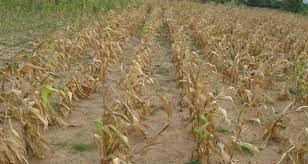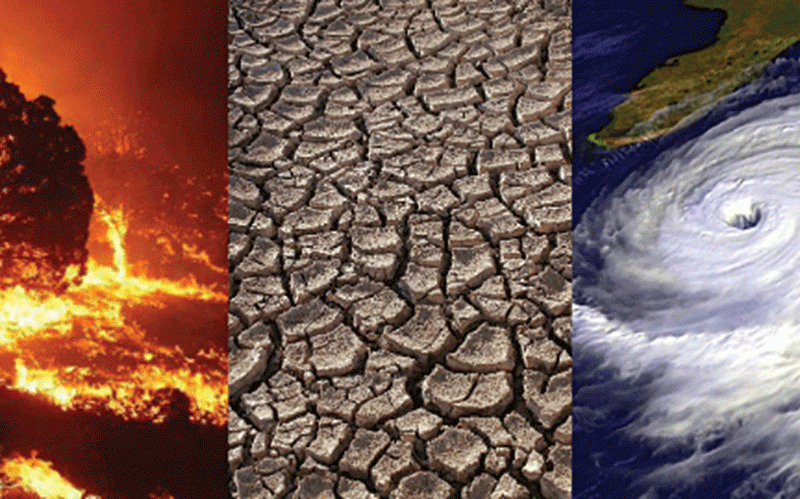
Vulnerability to climate change is considered high in Africa due to many factors.
These include, inter alia, heavy reliance on rain-fed agriculture, frequent droughts and floods, and poverty in many countries while adaptive capacity is low due to lack of economic resources and technology.
HIV/Aids pandemic and poor governance in many parts of the continent pose additional challenge to many households and communities.
Increased frequency and intensity of droughts and floods expected with climate change could worsen the food insecurity situation already prevailing in many parts of Africa.
Regions like sub-Saharan Africa where rain-fed agriculture accounts for over 90% of food production could be adversely affected by eliminate change.
Climate change could contribute to desertification through changing prevailing climatic conditions.
Current predictions of future climate show that some areas will become unsuitable for growing certain types of crops.
Sea-level rise would likely affect the tourism industry through beach loss, inundation, ecosystem degradation, saline water intrusion and infrastructure damage.
- Open letter to President Mnangagwa
- Feature: ‘It’s worse right now than under Mugabe’: Sikhala pays the price of opposition in solitary cell
- Masvingo turns down fire tender deal
- Human-wildlife conflict drive African wild dogs to extinction
Keep Reading
Tourism is a major foreign exchange earner and employs a significant number of people in many African/developing countries. The Intergovernmental Panel on Climate Change (IPCC) has unequivocally identified Africa as one of the most vulnerable continents to climate change, and the reasons are deeply rooted in its socio-economic and environmental context.
A cornerstone of this vulnerability is the overwhelming dependence on rain-fed agriculture. In sub-Saharan Africa, this method accounts for over 90% of food production, leaving livelihoods and food security precariously balanced on the reliability of rainfall.
Projections paint a grim picture, with estimates suggesting a potential decrease of up to 50% in rain-fed agricultural productivity by 2080 (UNFCC, 2012).
This decline, coupled with increasingly frequent and intense droughts and floods, directly threatens the sustenance of millions and exacerbates already prevalent food insecurity.
The spectre of desertification, fueled by changing climatic conditions, further compounds the agricultural crisis, rendering once fertile lands unproductive.
Current climate predictions indicate that certain regions will become entirely unsuitable for growing traditional crops, necessitating a radical rethink of agricultural practices and livelihoods. Coastal areas face their own unique set of threats, with sea-level rise poised to decimate the tourism industry – a major source of foreign exchange and employment in many African nations.
Beach erosion, inundation of coastal infrastructure, degradation of vital ecosystems like coral reefs, and saline water intrusion all contribute to a bleak outlook for this sector. Beyond agriculture and tourism, climate change is poised to severely impact Africa's water resources.
Already a dry continent with inadequate water supply in many regions, climate change is expected to further reduce water availability and access in these areas.
Conversely, East Africa, projected to receive increased precipitation, faces the challenge of heightened flooding, leading to damage to infrastructure, displacement of communities, and disruption of ecosystems. The human cost of climate change in Africa extends beyond food and water security. The changing climate is expected to alter the outbreak and distribution of climate-sensitive diseases.
The 1997/98 El-Nino event serves as a stark historical precedent, linked to outbreaks of malaria, Rift Valley fever, and cholera in East Africa.
Meningitis, on the other hand, is associated with the dry and dusty conditions that are likely to become more prevalent in some regions. These health impacts place further strain on already fragile healthcare systems and disproportionately affect vulnerable populations.
Despite these formidable challenges, Africa is not without agency.
Communities across the continent have a long history of adapting to environmental variability, developing traditional coping mechanisms to navigate extreme weather events.
Since the 1992 Earth Summit, various adaptation strategies have been implemented, ranging from policy reforms and technological innovations to research and capacity building.
Examples include the adoption of drought-resistant and genetically modified crops, diversification of agricultural practices, the use of improved farming technologies like agroforestry and integrated pest management, and the implementation of water-conserving technologies such as rainwater harvesting.
The promotion of cleaner energy sources like LPG and solar cookers, alongside policy reforms aimed at controlling deforestation, also represent crucial steps forward. However, the information clearly indicates that many of these crucial adaptation strategies remain expensive and largely inaccessible to the majority of the poor, who are often the most vulnerable to climate impacts.
Furthermore, comprehensive adaptation policy measures are still lacking in many African nations, hindering a coordinated and effective response.
This underscores the urgent need for increased financial and technological support from developed nations, acknowledging the principle of climate justice and the historical responsibility for greenhouse gas emissions.
The fight against climate change in Africa is inextricably linked to the battle against poverty. Natural systems form the bedrock of most African economies, and the poor are particularly reliant on these resources for their basic needs.
Climate change acts as a significant threat multiplier, eroding these natural foundations and exacerbating existing vulnerabilities. It is projected that climate change could push approximately 96 million more people in Africa into hunger, further entrenching poverty.
The poor often reside in degraded and weather-vulnerable areas, making them disproportionately susceptible to the impacts of climate change, extreme weather events, and rising temperatures.
With a significant share of the poor employed in the agricultural sector, the negative impacts of climate change on this industry directly translate to increased poverty.
Moreover, the rise in communicable diseases linked to climate change will disproportionately affect the poor due to inadequate living conditions and limited access to healthcare. The broader economic implications of climate change for Africa are substantial. Impacts on food systems, infrastructure, labour productivity, and ecosystems are likely to curtail economic growth, leading to reduced incomes and diminished opportunities, particularly for the most vulnerable.
However, amidst these risks lie potential opportunities.
The growing need for climate solutions presents avenues for investment and innovation in sectors like renewable energy and energy-efficient technologies. The business community has a crucial role to play in both mitigating risks and capitalizing on these emerging opportunities.
For instance, while the tourism industry faces threats, the renewable energy sector stands to gain from the increasing demand for clean energy alternatives.
The insurance industry, while facing increased risks from extreme weather events, can also drive adaptation by incentivising climate-resilient practices.
Zimbabwe, as highlighted in the provided information, the challenges of rain-fed agricultural production are increasingly apparent (IPCC, 2020).
The country's youthful population, with roughly 67.7% under the age of 35 in 2013 (2014 Human Improvement Report), represents a significant demographic that will bear the long-term consequences of climate inaction.
Organisations like All for Climate Action, a youth-led initiative, are playing a vital role in raising awareness and mobilizing communities to address climate change. However, their efforts, and those of many others across the continent, require greater support and resources to achieve meaningful impact.
Africa stands at a critical juncture.
The continent is undeniably vulnerable to the impacts of climate change, facing threats to its food security, water resources, ecosystems, and the health and livelihoods of its people. However, this vulnerability is not a destiny.
By building on existing community resilience, scaling up effective adaptation strategies, fostering innovation, and securing robust international support, Africa can navigate this climate crossroads.
Recognising the principle of shared responsibility and providing the necessary financial, technological, and capacity-building assistance is not just an act of solidarity , it is a moral imperative and a crucial step towards a more just and sustainable global future.
The time for decisive action is now, before the gathering storm unleashes its full fury on a continent already grappling with immense challenges.
*Gary Gerald Mtombeni is a journalist based in Harare. He writes here in his own personal capacity. For feedback Email garymtombeni@gmail.com/ call- +263778861608










